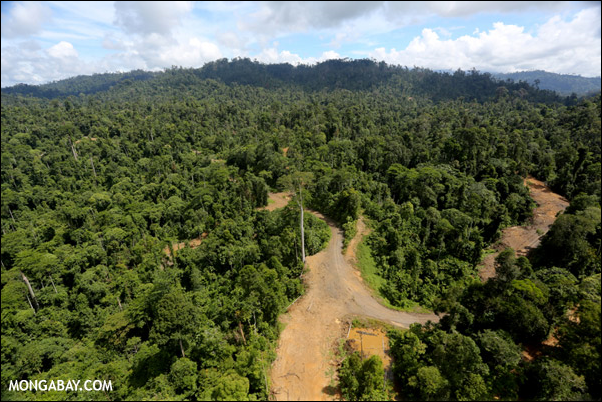Rainforest news review for 2013
By Rhett A. Butler
26 December 2013 (mongabay.com) – 2013 was full of developments in efforts to understand and protect the world’s tropical rainforests. The following is a review of some of the major tropical forest-related news stories for the year. As a review, this post will not cover everything that transpired during 2013 in the world of tropical forests. Please feel free to highlight anything this post missed via the comments section at the bottom. Also please note that this review focuses only on tropical forests. Check out these posts for 2013’s major environmental news stories and happy-beat stories for the year. Reviews from past years: 2012 | 2011 | 2009 […] While a number of companies moved toward less-damaging practices, vast swatches of forest and peatlands were nonetheless destroyed for new plantations. In Cameroon, U.S.-based Herakles Farms was allowed to proceed with a scaled-back, but still hotly-contested oil palm plantation. Originally slated for 73,000 hectares, including large blocks of dense tropical rainforest, Herakles won a provisional lease for 20,000 ha. Environmentalists fear the project will encourage further industrial oil palm expansion in Central and West Africa. A report from the Rainforest Foundation UK warned that plantations in the Congo rainforest will soon increase fivefold to half a million hectares. In Papua New Guinea, researchers said developers are seeking palm oil concessions to as a means to circumvent restrictions on industrial logging. The research, led by Paul Nelson and Jennifer Gabriel of James Cook University, found that less than 20 percent of palm concessions, covering nearly 950,000 hectares, are likely to be developed. Meanwhile a conflict between Malaysian palm oil giant Kuala Lumpur Kepong (KLK) and communities in Collingwood Bay grew more heated. In Indonesia, plantation expansion continued rapidly despite a sharp price in the price of palm oil, triggering several high profile conflicts, including a scandal involving PT Asiatic Persada after Indonesian security forces and hired thugs demolished a village inside a Sumatran concession. Nearly 150 homes were destroyed in the week-long raid. Greenpeace published a report arguing that conversion of forests for palm oil production is the single largest driver of deforestation in Indonesia, accounting for roughly a quarter of forest loss between 2009 and 2011. A series of studies published by the Roundtable on Sustainable Palm Oil (RSPO) estimated that some 3.5 million hectares of forest in Indonesia, Malaysia, and Papua New Guinea was converted for oil palm plantations between 1990 and 2010. Forest conversion was proportionally the highest in Papua (61 percent of plantations or 33,600 ha were established in place of natural forests), Sabah (62%: 714,000 ha) and Papua New Guinea (54%: 41,700 ha), followed by Kalimantan (44%: 1.23 million ha), Sarawak (48%: 471,000 ha), Sumatra (25%: 883,000 ha) and Peninsular Malaysia (28%: 318,000 ha). [more]
